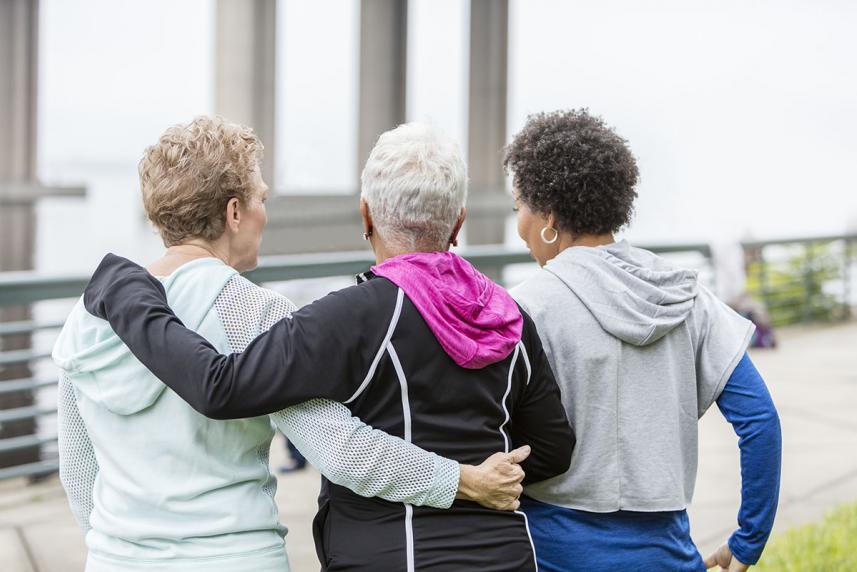
The Blue KC Care Management app makes it easy to get your questions about cancer answered. Download it now and use the access code kclinksupport to connect.
Six lessons — from someone who’s been there — that may help you navigate your own cancer journey.

When you’re a nurse taking care of somebody with cancer, that’s one thing. But when the tables are turned, that’s something else. Just ask Judy Bastian, of Annville, Pennsylvania. A couple of years after retiring as a registered nurse, she found herself back in the hospital. She had been diagnosed with colon cancer.
Her colon cancer treatment was difficult. But after surgery and chemotherapy, the 69-year-old is recovering and doing well. And as someone who’s seen cancer from both sides, Bastian learned a lot about how to get through it. Here, she shares some of those lessons.
Getting regular exercise helped Bastian cope with the stress during treatment. “I remember how afraid my patients were, and I felt pretty much the same,” Bastian recalls. “I was devastated when my doctor told me I had cancer. That fear, anxiety and worry were the same for me as it was for my patients.”
But as a nurse, Bastian knew that patients coped better with stress when they got up and moved. The American Cancer Society says that exercise is safe and helpful for people with cancer. It can help reduce feelings of depression and anxiety, lower fatigue, and improve sleep.
So, she laced up her sneakers and got going. Most days, she walked (sometimes for miles) with two close friends who were cancer survivors. “Being with them gave me hope that I could be a survivor too,” she says. “And just the act of walking was great. I had all this nervous energy. I would’ve gone crazy without walking it off. I felt so much calmer afterward.”
Other coping tips: Try meditation and prayer, deep breathing, or journal writing. “I did a lot of praying,” says Bastian. “That quiet time really helped with the anxiety and gave me a sense of peace and hope.”

The Blue KC Care Management app makes it easy to get your questions about cancer answered. Download it now and use the access code kclinksupport to connect.
Bring someone along to appointments, scans, and even to the hospital. “You’ll only retain about a third of what’s coming at you,” says Bastian. “I brought my husband, who’s good at remembering things. My mind was going a mile a minute and I couldn’t concentrate.”
Coping with cancer can feel like a big job you never trained for. It’s a good idea to ask for help. “There were so many phone calls and so many decisions to make,” Bastian recalls. Having someone to lend a hand — and speak up for you when you’re feeling overwhelmed — can make all the difference.
“Right after nursing school, I worked on a surgical floor where a lot of patients had cancer surgery,” Bastian says. “If they were upset, my job was to talk to them. I saw how much it helped patients when we’d chat.” Years later, she learned how much it helped her when she became the patient.
Bastian suggests not keeping your worries bottled up inside. “My nurses were so kind to me. They would come into my room and listen to me. That relieved some of my anxiety and took my mind off my worries.”
And don’t be afraid to open up to your partner or a trusted friend, or consider therapy. Tuning in to your mental health during this time is important. Studies show that cancer patients who deal with their feelings of anxiety and depression have better outcomes than those who don’t.
The members of your cancer care team are professionals who really know what they’re talking about. So, take their instructions seriously, Bastian advises. “I knew how important all that was from my nurse’s training,” she says. If you have surgery, for example, your medical team will give you instructions about wound care to follow at home. But don’t be afraid to ask questions if something isn’t looking or feeling right.
Being a nurse meant that Bastian knew the medical terms and the medications, which made the process easier for her.
But you don’t need to be a medical professional to learn about your cancer. Keep a running list of questions to ask your care team. Speak up if you don’t understand a word or technical terminology. And do your own research at reputable online sources, like these:
Try to tune out any negative voices, Bastian advises. “People sometimes want to tell you about who they lost to cancer,” she says. “I’d be thinking, Oh my gosh, I don’t want to hear this. Instead, I turned to cancer survivors to share their stories.”
Another tip: Count on your care team for medical advice. Call your nurse or send a message to your doctor through the online patient portal.
You can’t wish away your cancer. But a positive attitude — and a healthy dose of hope — can go a long way. “One of the biggest lessons I learned from my cancer patients was that no matter how bad things seem, we all need to keep hope,” says Bastian. “Their bravery inspired me. As I was going through my own treatments, I thought about them all the time. I’d think, If they could put up with all they had, I can put up with a little bit of suffering now.”
And hope, it turns out, is good medicine: A 2021 study found that optimistic cancer patients reported a better quality of life and less anxiety and pain (and even fewer side effects).
Additional sources:
Physical activity and cancer: American Cancer Society
Coping with anxiety: American Society of Clinical Oncology
Study on optimism and cancer: Annals of Surgical Oncology
Blue Cross and Blue Shield of Kansas City is an independent licensee of the Blue Cross and Blue Shield Association.